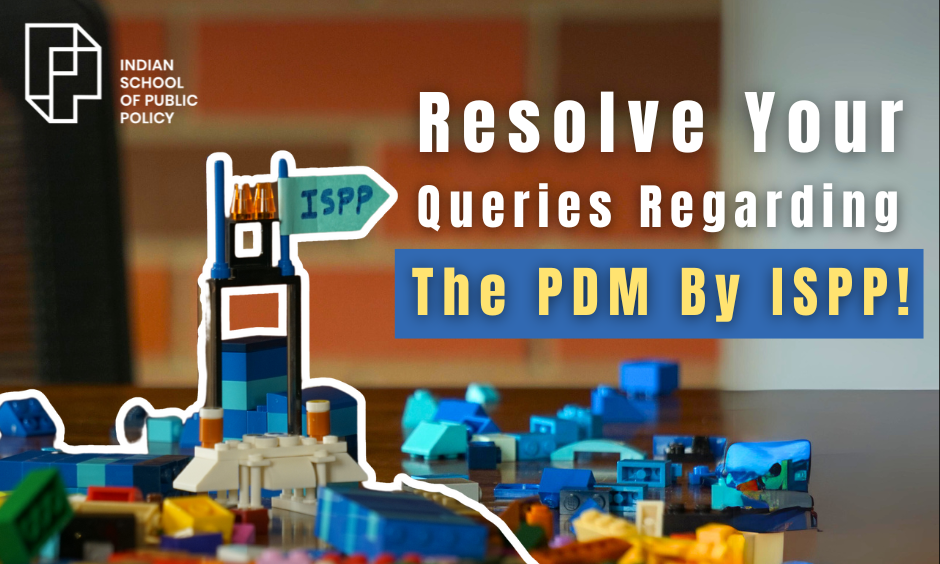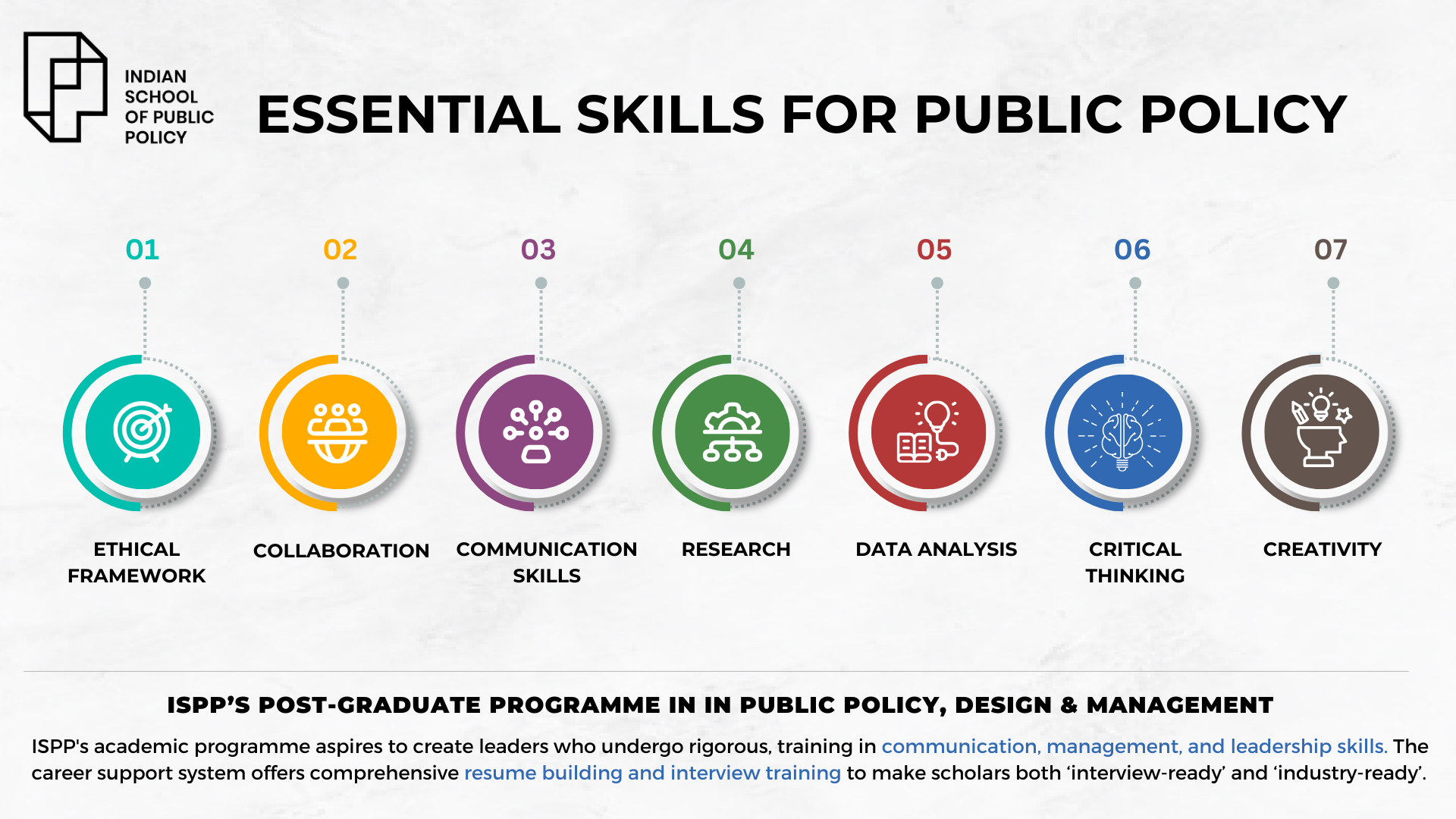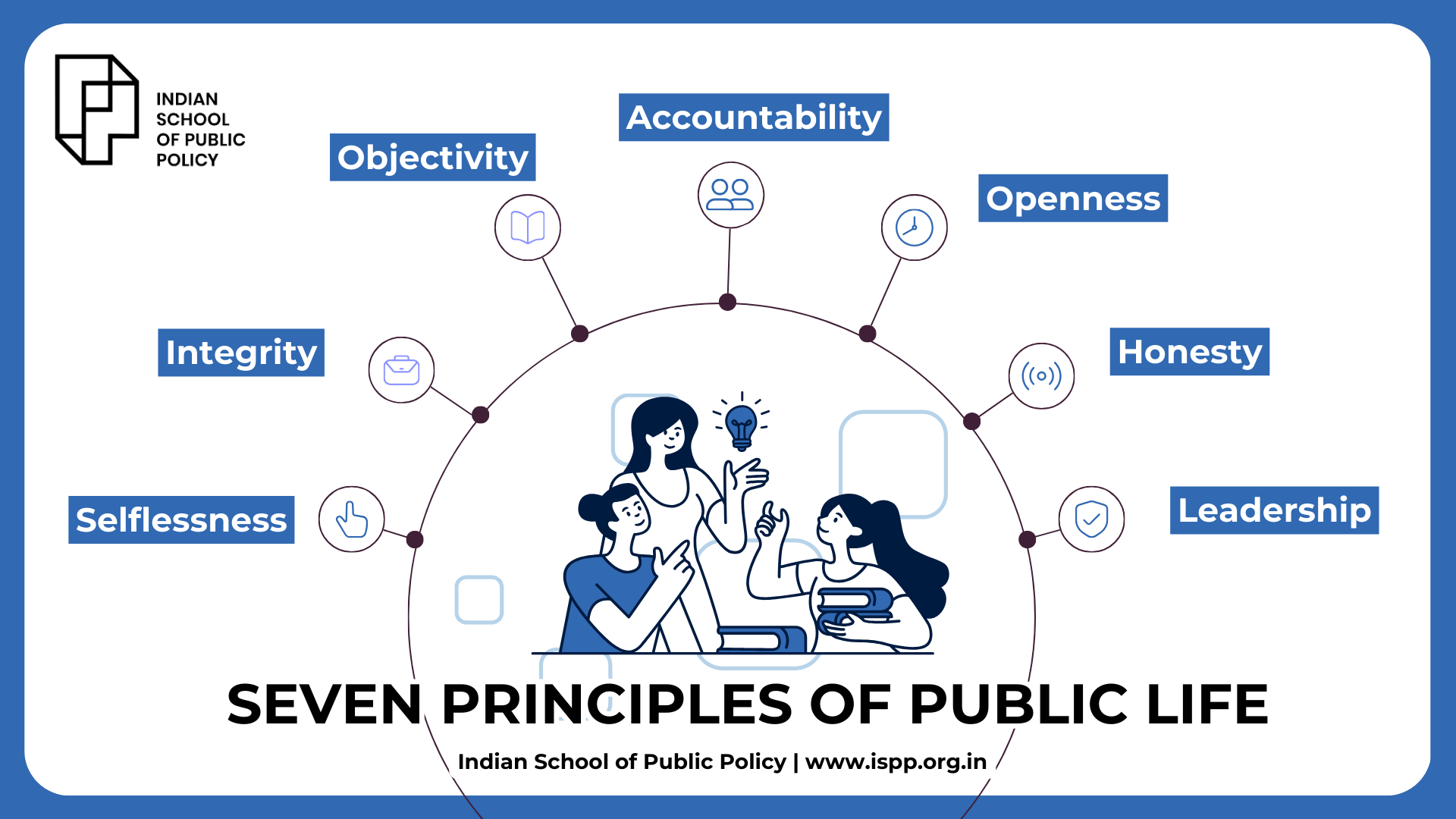
Resolve Your Queries Regarding The PDM By ISPP!

The Indian School of Public Policy (ISPP), committed to transparency, provides comprehensive FAQs on the school, its PDM programme, and the public policy domain.
In the pursuit of academic and professional excellence, aspiring individuals benefit immensely from a thorough understanding of programme and institute details before making pivotal decisions. This ensures alignment with personal goals and aspirations. The Indian School of Public Policy (ISPP), committed to transparency, provides comprehensive FAQs on the school, its PDM programme, and the public policy domain. This valuable resource empowers candidates with the information required to make informed choices, fostering a successful and fulfilling educational journey.
FAQs
🔷What are public policies in India?
Public policies in India encompass a set of laws, regulations, directives, and budget allocations devised by governments or their representatives to achieve public good goals. This involves an iterative process with various stakeholders contributing to the policy’s formulation.

🔷Who is the father of public policy?
In the context of India, often regarded as the Father of Public Administration, Paul H. Appleby has played a pivotal role. His influence, recognised as the Father of Public Administration in India, continues to shape the contemporary policy landscape.
🔷How many types of public policy are there in India?
Public policies in India can be categorised into three main types: restrictive, regulatory, and facilitating policies. These include laws, rules, regulations, judgments, case studies, and government programmes.
🔷Is Public Policy a good career in India?
Certainly, ‘Public Policy’ has become a sought-after course in Indian universities. Students are trained in this field, and some institutions even facilitate placements. Graduates may also secure positions as lecturers and professors in public and private universities.
🔷What are the challenges that India faces while implementing public policy?
India faces several challenges in public policy implementation, including an implementation gap, corruption, bureaucratic hurdles, limited resources, lack of political consensus, diversity and complexity, lack of accountability and monitoring, and infrastructure deficits.
🔷Why do we need to study Public Policy in India?
Studying Public Policy in India is crucial as effective policies promote economic growth, and public welfare, and enhance citizens’ quality of life. Despite this, there is limited interest in public policy education in India, and only a small percentage of policymakers undergo formal studies in this field.
🔷What is the first step in the public policy process?
According to a model, the public policy process involves five stages: problem identification and agenda formulation, formulation, adoption, implementation, and evaluation.
🔷What skills do you need for public policy?
Key skills for a public policy practitioner include an ethical framework, collaboration, communication skills, research and data analysis, critical thinking, and creativity.
Infographic:

🔷Who should study public policy?
A career in public policy is suitable for individuals who enjoy interacting with people, strive to bring communities together, and have an interest in the policymaking process.
🔷How have courses in public policy in India suddenly become popular among the youth?
The growth of the public policy domain in India over recent years has made it an exciting career choice. The field offers diverse opportunities, encouraging youth to pursue studies in public policy for impactful roles on national and international levels.
🔷What are the seven principles of public policy?
The Seven Principles of Public Life, known as the Nolan Principles, include Selflessness, Integrity, Objectivity, Accountability, Openness, Honesty, and Leadership.
Infographic:

🔷What is the scope of public policy?
The scope of public policy extends beyond government actions, involving collaborations between governments, international organisations, and non-state actors to address global challenges and pursue collective goals.
🔷Why is public policy important?
Public policy is crucial as it promotes social and economic equity, reduces income inequality, enhances access to education and healthcare, and supports marginalised communities.
🔷Who are the actors in policymaking?
Policy actors encompass individuals or groups affiliated with or affected by the policy process. They include governments, businesses, NGOs, civil society organisations, communities, and individuals.
🔷How do I start learning about public policy?
To begin learning about public policy, individuals can pursue online coursework in related fields, including foreign policy, global public health, and natural resources.
🔷What are the benefits of a public policy programme?
Public policy graduate programmes help develop communication and negotiation skills, enhance social and communication skills through project work and case studies, and provide a platform for interacting with diverse perspectives.
🔷What is the role of public policy in Governance?
Public policy plays a crucial role in governance by addressing and solving citizens’ issues, making the governance system more accountable and reasonable.
🔷What is the job of a policy analyst?
A policy analyst is responsible for examining existing policies’ efficacy, proposing suggestions for improvement, and laying the groundwork for new programmes and legislation to meet objectives and goals.
🔷How can I become a policy officer in India?
Becoming a Policy Officer typically requires qualifications in a relevant field, and many candidates may complete postgraduate study for this role.
🔷What is the salary range for a Public Policy Specialist in India?
Salaries for Public Policy Specialists vary based on experience and employer. Here are indicative figures:
- NITI Aayog: ₹12.0 to ₹30.0 Lakhs for 8-10 years of experience.
- OPPO: ₹21.6 to ₹29.9 Lakhs for 10-11 years of experience.
- Ministry of Electronics and Information Technology: ₹10.8 to ₹20.7 Lakhs for 6-10 years of experience.
You can check more here.
🔷Which is a good school for Public policy in Delhi?
The Indian School of Public Policy (ISPP), incubated by the Centre for Civil Society, is a leading institution for public policy education in Delhi. ISPP aims to develop a new class of policy leaders for India and the region.
🔷What is the fees of the Indian School of Public Policy?
ISPP’s Postgraduate Programme in Public Policy, Design and Management has a Total Programme Fee of ₹8,40,000 with an Infrastructure Development fee: ₹ 40,000 (+18% GST) for the 2024-25 Academic Year.
The detailed fee structure for ISPP’s PDM is as mentioned here.
🔷Who is the founder of the Indian School of Public Policy?
Luis Miranda and Parth J. Shah are the Co-Founders of the Indian School of Public Policy (ISPP).
Check out Luis Miranda’s LinkedIn account.
Check out Parth J. Shah’s LinkedIn account.
🔷Is the Indian School of Public Policy worth it?
The Indian School of Public Policy (ISPP) is considered worthwhile by those who have experienced it, with a rigorous course and opportunities for career advancement.
🔷How is ISPP contributing to transforming India through stronger public policies?
The Indian School of Public Policy (ISPP) plays a crucial role in transforming India through its highly respected Post Graduate Programme in Public Policy (PGP). This comprehensive programme prepares students for impactful careers in public policy by equipping them with interdisciplinary knowledge in economics, political science, law, management, and data analysis. The curriculum, structured over three trimesters, emphasises practical learning through case studies, workshops, and field visits. Engaging with policymakers, practitioners, and experts enhances students’ real-world understanding, fostering their potential to become effective policy professionals in government, civil society, or the private sector.
🔷What is the Admission Criteria for ISPP’s PDM programme?
Eligibility for Admission
- Graduates from any discipline, from Indian or International universities.
- Final-year undergraduates can apply but must complete their degree before the PG programme starts.
- Work experience is preferred but not mandatory for outstanding candidates.
- No specific skills or technical background is required, except for numerical literacy and language proficiency.
- Selection focuses on curricular and extracurricular activities to assess excellence and commitment.
- Ideal candidates demonstrate collaborative ability, leadership, communication skills, humility, and adaptability.
Learn more.
Register your Interest to Study at ISPP

🔷Admissions Timeline
- ISPP offers three admission rounds for its PG Programme in Public Policy, Design & Management.
- The second and third rounds depend on seat availability.
- Early application is advised for opportunities like assistantship and advanced academic preparation.
- Enrolling early also grants access to special guest lectures and networking events before the programme starts in August.
🔷What are the Career Opportunities provided by ISPP to its students?
ISPP’s PGP opens diverse career opportunities for students in public policy. Graduates are well-prepared for roles in government, civil society, think tanks, and the private sector. The school’s dedicated career services team supports students in their job search and networking efforts, ensuring a seamless transition into impactful roles.
🔷What Qualities & Skills Should A Policymaker In India Be Equipped With?
Essential skills for a proficient public policy professional include:
- Research and Data Analysis
- Critical Thinking and Creativity
- Persuasive Communication
- Collaboration
- Ethical Framework
🔷What are the shortcomings in the healthcare policies in India?
Concerns regarding healthcare affordability affect over 60% of Indians, with more than 80% self-funding their medical expenses. India’s healthcare policies face challenges, but the future seems promising with evolving policies and technologies that aim to enhance access, affordability, and care quality. Collaborative efforts among healthcare stakeholders are crucial as we approach 2030 to create a sustainable and inclusive healthcare system for all.
🔷What are the future innovations in healthcare?
Future innovations in healthcare are driven by technological trends such as AI and digital technology. Emerging trends include telemedicine, mobile health, virtual conferencing, and the Internet of Medical Things (IoMT). These innovations aim to address crises, improve virtual care, and revolutionise healthcare delivery.
🔷What is the Health Policy 2025?
The Health Policy 2025 endeavours to reduce early deaths from cancer, heart issues, respiratory diseases, and diabetes by 25% before 2025. This policy emphasises sustainable development and sets measurable targets to enhance the overall health and well-being of the population.


